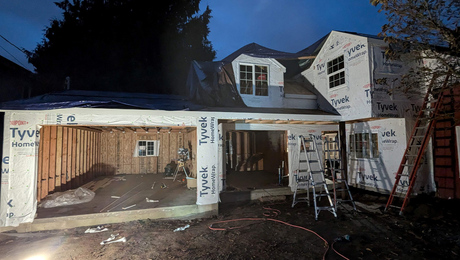Hi all –
Getting ready to tile a kitchen backsplash. It’s just bare, unprimed drywall at the moment. Should it be primed before tiling? Primer in question is USG’s First Coat.
My instinct is to go ahead and prime it, as I’m concerned about the drywall absorbing too much H2O from the thinset and screwing up my tile job. But if it isn’t necessary (or more accurately, isn’t going to make the slightest difference) I don’t want to waste the time and primer.
So…what would you do?
Jason















Replies
Don't prime.
You'll get a better bond directly to the drywall.
You can tile over primed rock, but IMO, it's better over bare sheetrock
Jason,
I always seal drywall before applying any finish, whether wallpaper,ceramic tile or paint, it helps keep the surface from being moisture damaged during the application of the finish material.
Don't skip it.
Geoff
Geoff is right. Prime it.
Zee prime before zee tile.
I too am preparing to tile a kitchen backsplash. Since I have yet to install drywall in the room, I was considering using some form of cement board in place of drywall on the area of wall that would recieve tile, thinking tile directly on drywall was not recommended.
Would cement board be overkill or is tile on drywall perfectly OK?
Where there is water I'm not sure there is ever overkill.
There are drywall type products designed for tile and wet areas. G-P has DensShield. I used it in a narrow bath that is part tile, part painted.But as another poster said, where there is water, it is hard to imagine overkill. Be sure to caulk the joint between the tile and the countertop, not grout.
I'd never put tile on drywall.
MikeInsert initially amusing but ultimately annoying catch phrase here.
Most backsplashes never get wet to any degree. They just look nice and facilitate cleanup of mixer splatters, etc. For these drywall is fine and you don't need thinset -- tile mastic will work just as well if not better.If a backsplash may actually get wet (eg, in a commercial kitchen around a dishwashing area) then it's different.I'd prime the drywall.
So convenient a thing it is to be a reasonable Creature, since it enables one to find or make a Reason for everything one has a mind to do. --Benjamin Franklin
Tile on drywall is perfectly O.K. in this application (kitchen backsplash), you will never get enough water on it to cause any concern. If you do, you've got more to worry about than your backsplash.
Cement backers require a vapor barier installed behind them, they are for use in wet areas, such as showers or tubs........ not to mention the difficulty/mess of cutting cement backers.
The Denshield product that was mentioned is also for wet areas but does not require a vapor barrier behind it, as it has a water-proof face, you could use it instead of drywall, but that's just wasted $$, IMO.
thinset vs. tile...your choice, either is fine in this application....
Oh, and make sure you prime before you tile.
Geoff
Edited 7/1/2007 12:57 am ET by Geoffrey
Jason,
I've never used thinset on drywall for a backsplash; always mastic. ( I've never used thinset on drywall period.)
I don't know if it would be better to prime, couldn't hurt, but in my IMHO its not really neccessary. I've torn alot of tile off of sheetrock that was not primed and was set with mastic. EVERY time it has wrecked the sheetrock beyond repair, cause it stuck so well.
Now, when I get a job to replace a tile backsplash, I just plan on replacing the sheetrock also.
Under normal circumstances, I would not consider a backsplash a wet area. I'd just stick it, grout it' and seal it real well.
Just my opinion!
dug
I'd prime it myself
Welcome to the
Taunton University of Knowledge FHB Campus at Breaktime.
where ...
Excellence is its own reward!
Thinset on drywall makes no sense to me. USe mastic/glue.
If you use thinset use a cbu..
"What people will notice and remember is the broad brush of how how we act.We can aspire to reach our high ideals, or we can slide down the slippery slope towards the despicable." rjw
http://www.john-lennon.com/imagine-neilyoung.ra
http://WWW.CLIFFORDRENOVATIONS.COM
I wouldn't prime
But I would definitely sponge it down first to remove whatever drywall dust might be sitting on the surface, this would insure the best bond.
Also, use a high quality mastic
I see we have a consensus on this one..........................:)[email protected]